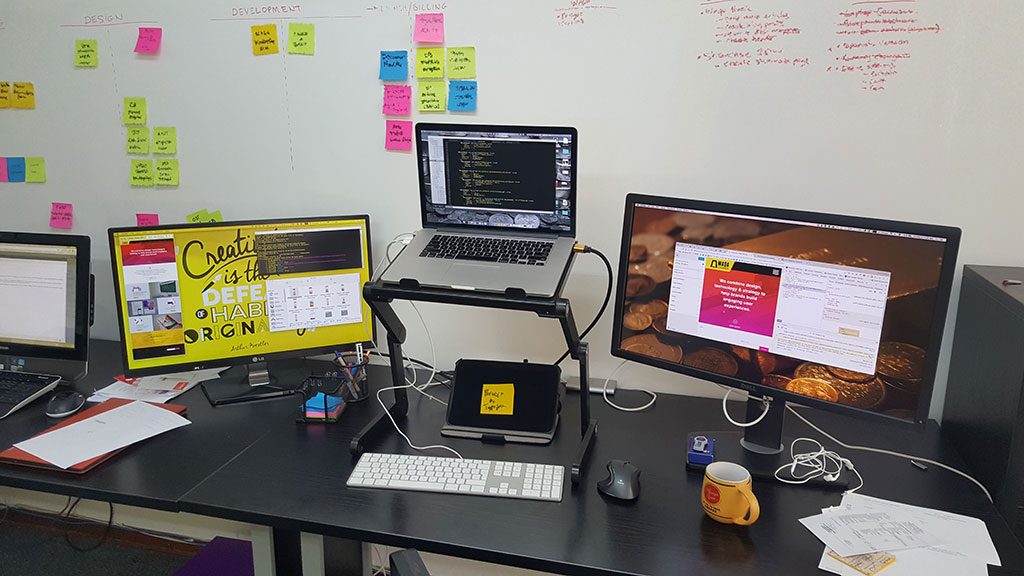As Waqa Studios grows we’ve become international, so we’ve been looking at how best to manage remote teams. One of the many keys to being able to do this is for our team members to be able to manage their own working environments when working from home rather than our Lima office. Many of our clients are small businesses just like us, with founders working from home offices and/or with remote teams work from home. These are the simple hacks we’ve discovered that really help make working from home, well, work.

Fake a commute
Home can be altogether too comfortable. Glasses of wine, Netflix binges, lounging on the couch. Kids? It can also be a place of never ending chores. Picking stuff up, scrubbing stuff down. None of these activities go particularly well with sitting down, sitting still and concentrating on running your business. The temptation to slack off, or procrastinate with chores, can be overwhelming.
A fake commute might be just want you need to get into the right frame of mind. Wake up, get ready, then leave the house on time for work. Take a 15 minute walk. A brisk walk mind you, you don’t want to be late for work. Arrive back home and enter your “workplace”, don’t think of it as your home. You can leave “work” and dash back “home” whenever you want, just make sure you make the commute each time you want to do this.
Dress for the job
You wouldn’t turn up at an upscale Manhattan office in shorts, that scruffy t-shirt you sleep in and having skipped a shower, so don’t turn up at your home office that way. Meetings with clients may well be all conducted over the phone that day, but if you look sloppy, you’ll feel sloppy and you’ll work sloppy.
Before your commute into work, dress to impress, just as you would if you had an important investor meeting. Give you everyday customers a taste of the most professional you possible, even if they’re across the country.
Make use of technology
Remote working is easier than ever. Technologies now exist to keep teams constantly connected. Services like Zendesk and HelpScout deliver client requests to the right employees. Tools like Slack and Hangouts let teams continuously communicate. Project management and task tracking, and assigning tasks to team members, is made easy through kanban boards from services like Trello, or agile sprints with Jira.
Find the right tools to manage your own processes that work best for your business type. If you’re a solopreneur (or even not), enforce the right tools on yourself. You’re also an employee of your business.
Stick to office hours
It can be tempting to lounge around all day and put off that work you need to get done until the night, especially if you’re a night owl. But if that wouldn’t cut it in a traditional job, then it won’t cut it when working from home either. Obviously a certain amount of leeway is one of the mayor benefits of homeworking, and you certainly can switch from an hour-based model to a task-based model of work. That means you get paid (and get seen to be successful) based on what work you complete and how well you complete it rather than just putting in face-time in the office and looking busy.
If you’re part of a team you’re still almost certainly expected to be immediately available during regular working hours. You also need to correctly schedule your tasks into slots of time and complete all of them on time and to spec. You might not immediately notice yourself slipping, and that could mean you might find yourself out of a job pretty quick.
Close the door
For some people, working from home can be near impossible if you share that home with other family members, particularly kids. Sure, your kitchen table might seem like a dream office with a constant supply of coffee and snacks at an arm’s reach, but if people are passing through, making small talk, making noise, you’re never going to be able to get anything done.
Find a space you can dedicate to your work, a place where you won’t be interrupted and you can close the door to the world. If possible, have your home office be a room that’s only used for the purposes of work, and set it up as such.
My own office setup, which I don’t have at home and so I prefer working from the office for certain tasks.
If like Waqa Studios, you or some of your employees have the choice between coming into the office or working from home, celebrate the fact that your home office is at home and decorate it accordingly! If you’re team in entirely remote, consider allocating a small amount of additional money to help employees create their ideal home work space.
There can be major benefits to working from home, at least some of the time, if you find a way to make it work for you. This is what worked for us. If you have any suggestions of your own, I’d love to hear about them in the comments below!


